
UPDATE (March 14, 2022): like DuckDuckGo, Qwant has also decided to censor RT and Sputnik (Russian state media). Text slightly changed below.
UPDATE 2 (April 2, 2022): as noted below, Gibiru routes their results through Google. So, no. But I discovered Seekr.com, which seems like a possibility. Need to evaluate the extent to which they use Google and Bing.
The Problem: DDG Has Jumped the Shark
I would not use Google; it’s both censorware and spyware. And I would not trust Bing, or Yahoo, which is powered by Bing, for the same reason. Such reasoning is why many of us switched to DuckDuckGo in the last few years, despite the fact that Bing is one of their sources. In addition to supporting user privacy, when I switched, they seemed to be of decent quality and, importantly, not to be censored.
Unfortunately, that seems to have changed. Read this from DDG’s CEO:
Very well, now DuckDuckGo’s CEO has as good as declared that they, too, have been censoring their results (I’ve been wondering, frankly) and as a company are not afraid to announce censorship policies.
Now, let’s be clear. I have no issues with search engines using a wide variety of methods of determining the most relevant and useful search results. A search engine need not be strictly a popularity contest, for example, a la Google. But when a search engine specifically declares that it will censor (yes, down-ranking is a kind of censorship) “sites associated with Russian disinformation”, that signals that they have set themselves up to be arbiters of what counts as political “disinformation.” That is not a role I want a search engine to play; as a conservatarian, I would not even want a search engine to weed out left-wing establishment views from results, because I want to know what those people are saying, too.
The Alternatives
It takes a while to create a good search engine—we saw that in the late 90’s with Google, and then much later with DuckDuckGo itself. Are any other search engines (1) competent (surfacing many relevant search results) and also (2) unbiased? This is hard to determine, and one cannot make any conclusions without actually trying them out.
Let us review some of the more interesting alternative search engines on offer, comparing them on a variety of searches: (a) encyclopedic/general info (are the results relevant/useful?); (b) current news related (unbiased/balanced?); (c) technical (do they actually find good StackOverflow or other forum answers to problems?); (d) other assorted searches, including philosophy, theology, and geography/local.
I will look at Brave and Qwant in detail, and Gibiru, Gigablast, and Mojeek briefly. I will not be reviewing StartPage for the simple reason that they use Google, nor Swisscows or OneSearch, because they use Bing. (By the way, if you want a family-friendly search engine that doesn’t use Google data, Swisscows might work for you or your kids.) In fact, one of the dirty little secrets of the world of alternative search engines is that most of them are just the biggies repackaged—but not all. I am also not going to consider the English Yandex, because it’s run by Russians. I certainly have nothing against Russians, but I also don’t want a Russian point of view and, indeed—they do engage in propaganda, just as Google does.
So here goes. I will focus on the desktop experience. I will begin with the search engine so many people on Twitter were recommending in response to a recent tweet of mine:
Brave Search
Brave Search is associated with the Brave browser I’ve been using. Both were founded by JavaScript developer Brendan Eich, who was canceled by Mozilla for giving money to the anti-gay marriage side in the California proposition 8 debate. Brave Search does its own indexing but also makes use of other search engines as well. They are focused on privacy and, one might expect, offering a broader ideological landscape. But the latter, not so much.
George Washington
- Nice pre-search results! Neat!
- I’m not French. Why the heck am I getting this at the top of my results? But this might be a temporary glitch, because I didn’t see this message when I tried the search later (I don’t think I dismissed it either).
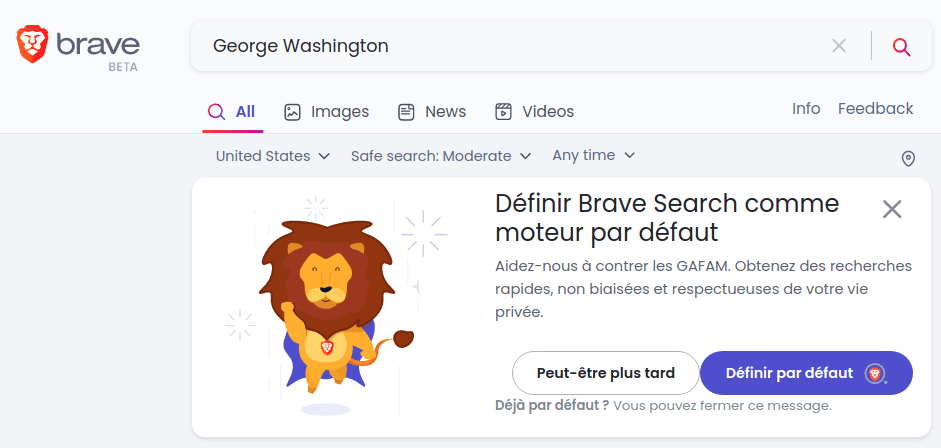
- But when I search “GAFAM” on Brave, apart from pushing Wikipedia right to the top, the results seem rather good to me: a nice variety, sources seem credible and the offerings useful.
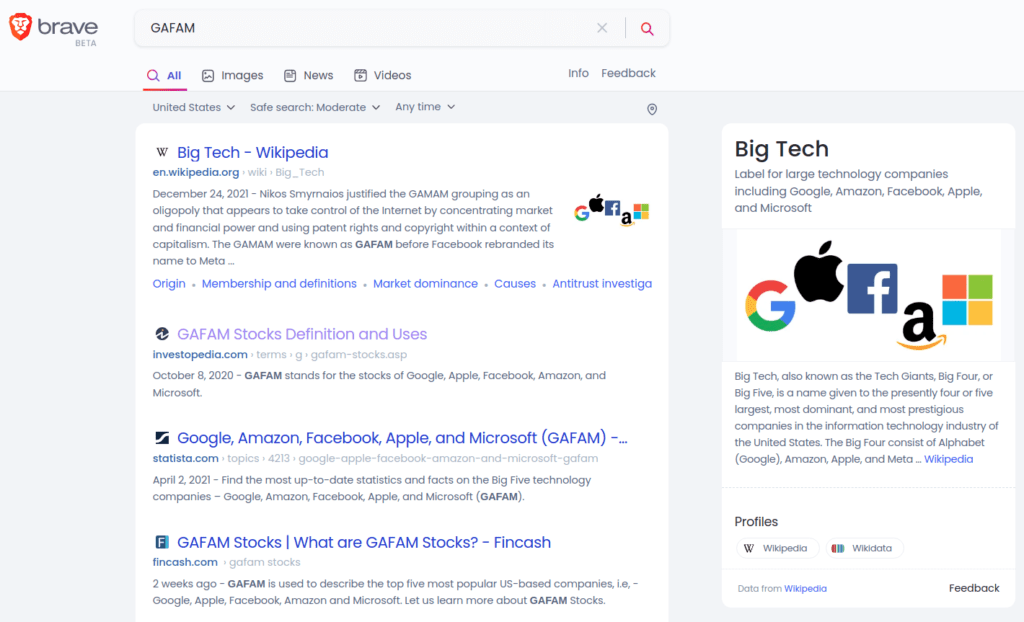
- Anyway. Back to Brave’s “George Washington” results. Ugh, here’s Wikipedia right at the top!
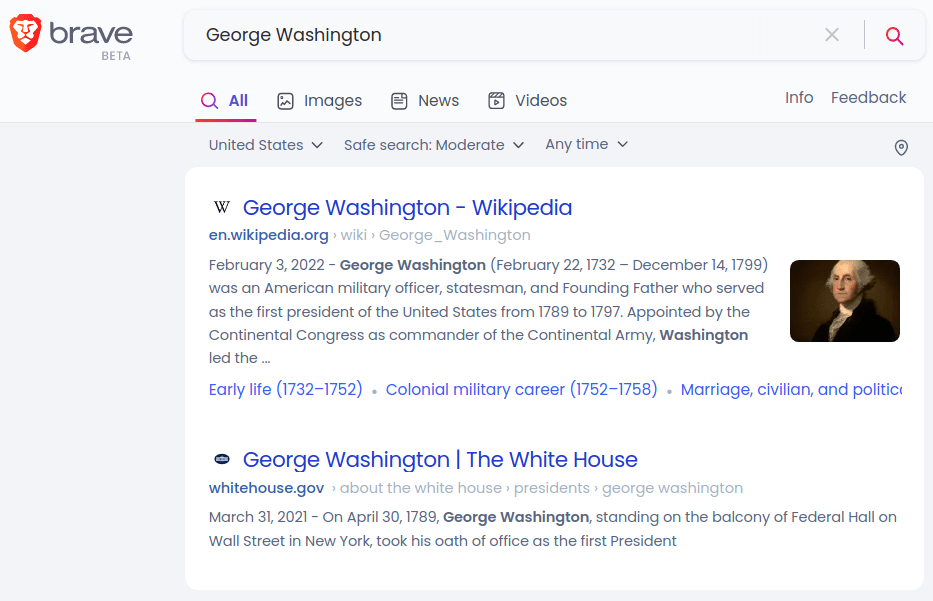
- Then comes GWU, a history.com page, the Mount Vernon museum, Britannica, GWU law school, the Mount Vernon museum again, the Miller Center (on the presidency), etc. Not bad, on the whole.
catcher in the rye summary
- Actually quite good, as far as I can tell. A lot of relevant information. SparkNotes #1, Britannica #2, Wikipedia #3.
Where do ducks go when ponds freeze over?
- Only OK. First two results are from answers.com, ugh. The first answer isn’t bad, the second sucks, the third is autogenerated SEO-gaming nonsense, and the rest actually seems to be OK.
Now some current news-related topics.
Ukraine
- In order, the results (below) are: Wikipedia, ABC News, then comes an “In the News” section (from CNN, NYTimes, and NBC News…ugh), Britannica, a Guardian category page, a NY Times recent update, a CBS News category page, a CNN recent update, the State Dept. page.
- This is surprising and disappointing in two ways. First, there are no conservative sources among the news results: I checked, i.e., on the first page, not a single news result from anything that wasn’t obviously liberal/progressive. Highly favors CNN, NY Times, CBS, and NBC.
- Second, since the search phrase didn’t specifically concern the news, I wasn’t expecting to find such an extremely high concentration of news-related results. If I had wanted news, I would have clicked on the news tab. The general search should not give me news predominantly.
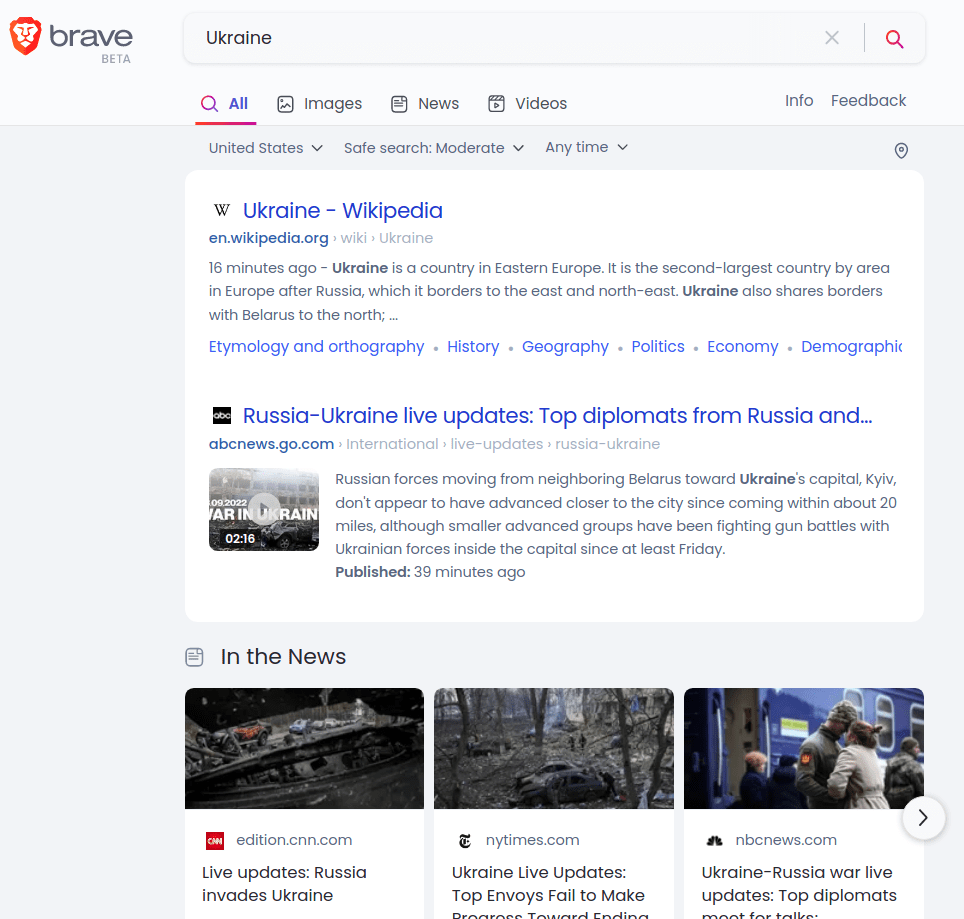
inflation and gas prices
- While my search is fairly generic (the relationship between inflation and gas prices is a fairly important topic in economics), again, most of the results are news. Not my preference.
- Sources in order: CNBC, LA Times, Pew Research, NY Times, WaPo…ugh again.
trans terf controversy
- The thing I’ll look for here is pretty much anything that isn’t in favor of the trans political agenda. And…yeah, it’s almost all news and explainers told from a pro-trans political agenda (the NBC News seems relatively even-handed between trans and feminist), and all Dave Chappelle and J.K. Rowling, who cause old liberals difficulties because they’re not exactly conservative but they refuse to get in line with the trans agenda. But maybe pro-trans folks are all who are actually, you know, writing about this?
Now some technical searches.
java.lang.IllegalArgumentException: An SPI class of type org.apache.lucene.codecs.PostingsFormat with name ‘Lucene90’ does not exist. You need to add the corresponding JAR file supporting this SPI to your classpath. The current classpath supports the following names: [IDVersion]
- This is a search recently performed in this household. No results from Brave. DDG does fine with it.
How to initialize an array of the first ten integers briefly ruby
- Generic results only. Does not actually answer the question, but plenty of specific answers are available. DDG is much better.
Now, for special interest to me, I’ll do some random searches on topics of interest to me: philosophy, theology, geography/local, and Irish fiddle.
Thomas Reid theory of perception
- Wow! Really not bad at all! SEP is #1, then two academic sources, then a book by a guy I went to grad school with, then IEP. Well done!
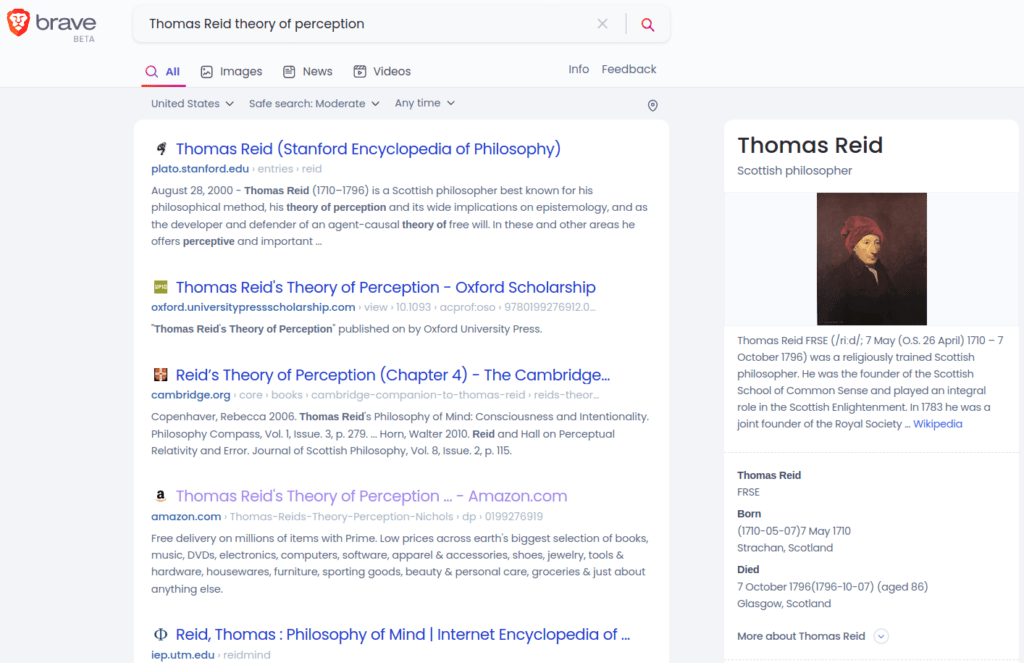
“God was with him” (in quotes)
- Wow again! Quotation pages from the Bible, followed by specific commentary on the meaning of the phrase.
- Moreover, despite the fact I used quotation marks in my search, the results also (even mainly) include pages about “The Lord was with him.”
pizza near me
- I’m reasonably pleased with the map that I get as a result (below). Glad they don’t depend 100% on Yelp.
- This is not where I live, but it is probably close to the Verizon server I’m connected to.
- When I substitute the name of the nearest town to me, I get an auto parts store and an apartment building as #2 and #3. That’s weird. The rest of the results are OK.
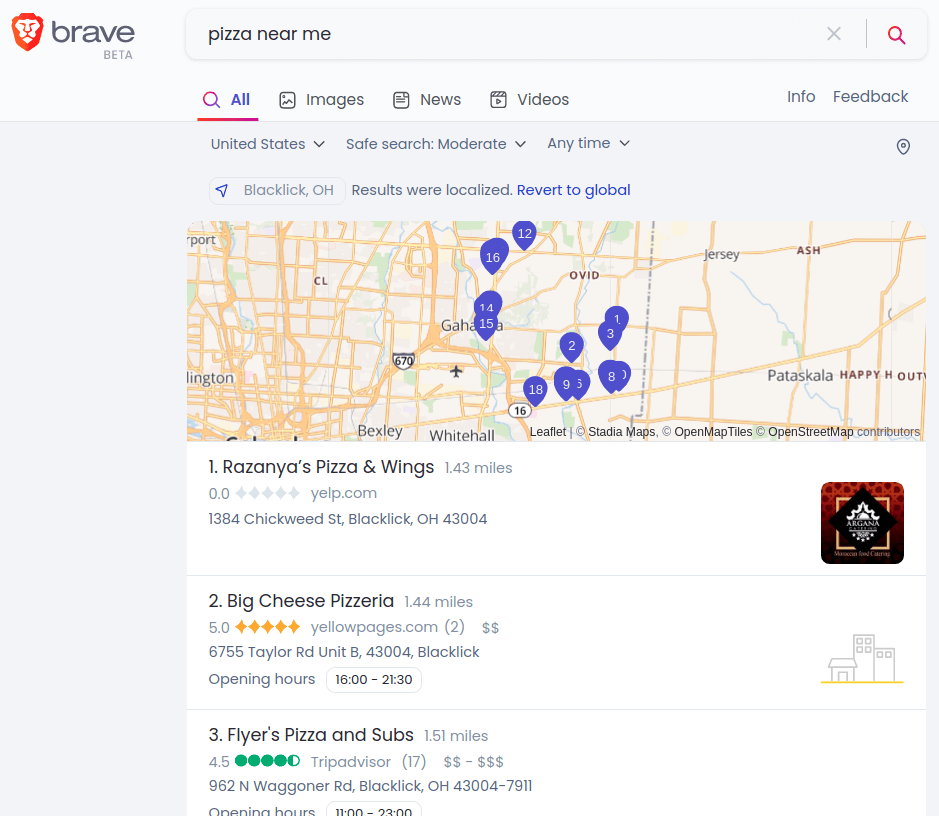
‘Shamrock Hill’ reel
- The page from thesession.org should be in the #1 place, but #3 is OK. DDG is better. Not very good results, but far from not useless. But:
“Shamrock Hill” reel (with double quotes instead of single quotes)
- I tried the search again now with double quotes, and lo and behold, the results are pretty much perfect. Just the results I would expect, in the order I’d expect.
Summary of findings about Brave Search: for a relatively new search engine, it was better than expected. Several times, the search had results that were as good as DDG’s. It is still a bit rough around the edges, though. The biggest issue I have with it is in the news topic related searches: they could have been delivered by Google, they were that focused on mainstream liberal-left news. If I am going to abandon DuckDuckGo because they are pushing a liberal-left viewpoint now, I don’t see why I wouldn’t draw the same conclusion about Brave Search. Sorry, Brave. I have to call it as I see it.
Qwant
Qwant is French, nine years old, and another search engine that is highly focused on privacy. They’re supposed to do their own indexing. Last I checked, long ago, they definitely weren’t ready for prime time. But maybe they’re better now. I’ll comment at the bottom about the claim that they depend on Bing. I’ll try the same searches I did before.
But first, an update, as a tweet came to my attention the day after first publishing this blog post.
So apparently, Qwant too has decided to decide for its users what ought to count as “war propaganda.” Make use of that information as you will; but for me, as with DDG, this is a decisive count against them. Again, this is not because I hold a brief for Russia or Russian media in particular, but simply because, if a search engine presumes to make such a decision on my behalf, then I cannot trust them not to make other censorious decisions as well.
George Washington
- The results, even with Wikipedia right at the top, are very similar (including many of the same results, in a different order) to Brave. Not bad.
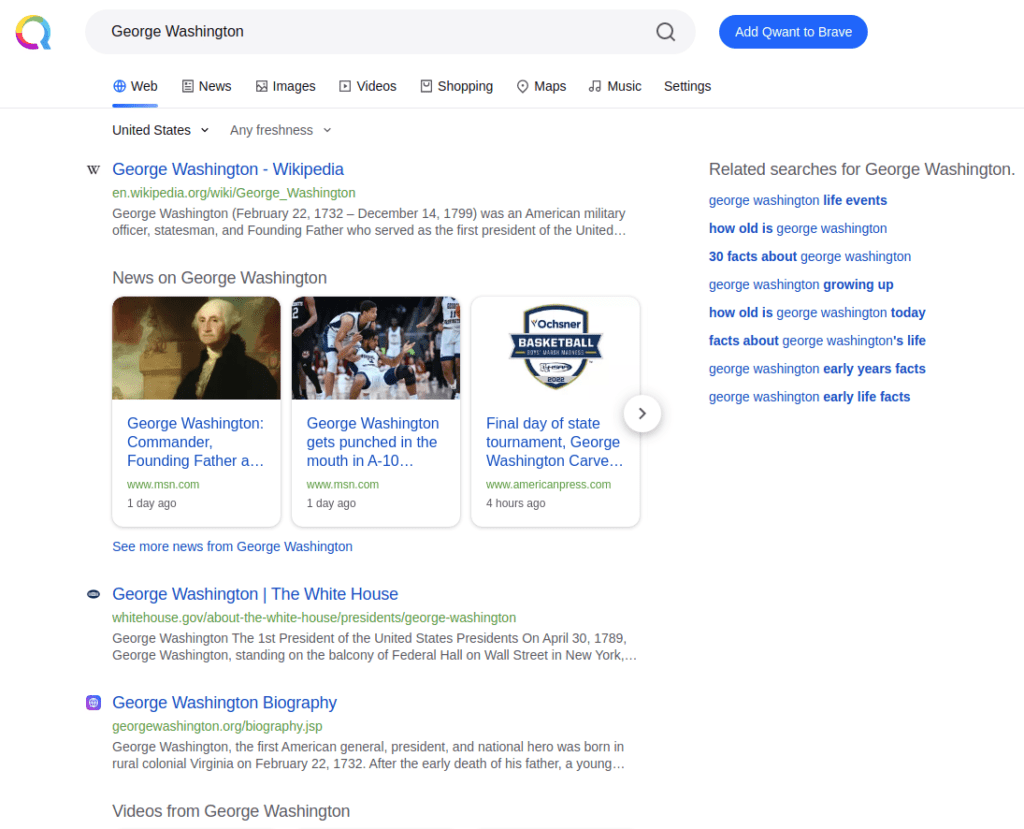
catcher in the rye summary
- This is a bit better than Brave. It has all the lit sites I’m used to seeing: SparkNotes, LitCharts, ThoughtCo, GradeSaver, WritingExplained, CourseHero, etc. Wikipedia is there, but in spot #7.
Where do ducks go when ponds freeze over?
- Again, quite good answers. Has something from Parlia before the two Answers.com answers (ugh), and the rest of the results seem plausible. Better than Brave again.
Ukraine
- We get a flag, map, and infobox in the left column, above the regular results, which frankly makes some sense to me. Pretty attractive.
- Despite being French, Qwant knows I’m American and shows me American news sources. Like Brave, the results are mostly news, but not entirely. Sources: NBC, Sky, CBS, CBS Local (LA), MSNBC, the CIA World Factbook, State.gov page on Ukraine, Fox country landing page, MSN page on “war in Ukraine,” and finally a page on Ukraine from PremierChristianRadio.
- While again there is not enough general info, and too much news/orientation from liberal sources, but at least they actually had Sky, Fox, and PremierChristianRadio—all three establishment conservative sources. Interesting. Better than Brave.
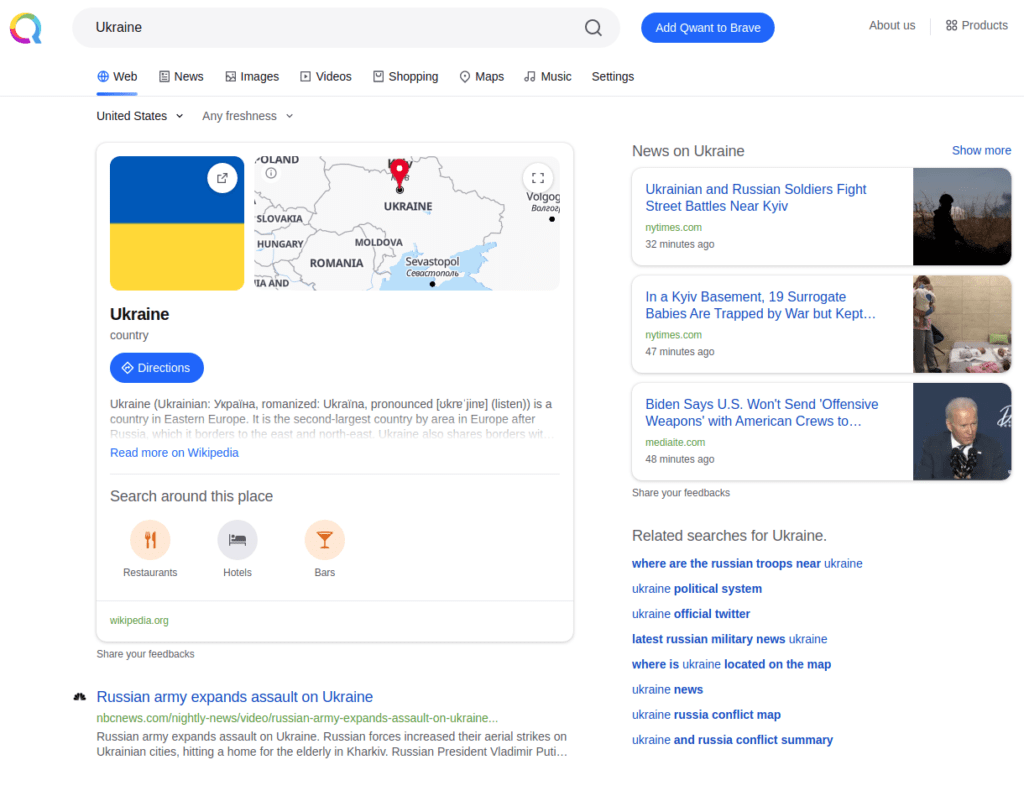
inflation and gas prices
- This leads with the gas prices page from USInflationCalculator.com, which seems very appropriate. The other sources are USN&WR, CNBC, CNN, Fox Business, Motor Trend, NY Post, a radio station, CBS Local (Boston), and finally an economist’s blog that actually addresses the question, “What happens to gas prices during inflation?” Dang, Qwant is just leaving Brave in the dust here. Where Brave had nothing but establishment left and local sources, at least Qwant has CNBC and USN&WR (maybe more centrist), Fox Business, and NY Post. No big complaints here.
- But several results match perfectly with Bing, albeit in a slightly different order.
trans terf controversy
- Now we enter real controversial territory, and Qwant is like Brave: different selection of articles, but 100% on the trans side (see below).
- I find it hard to believe that the “terfs,” i.e., the (typically) radical feminist and especially lesbian commentariat has nothing to say about the controversy. But it’s not implausible that their stuff is mostly buried in relatively obscure blogs.
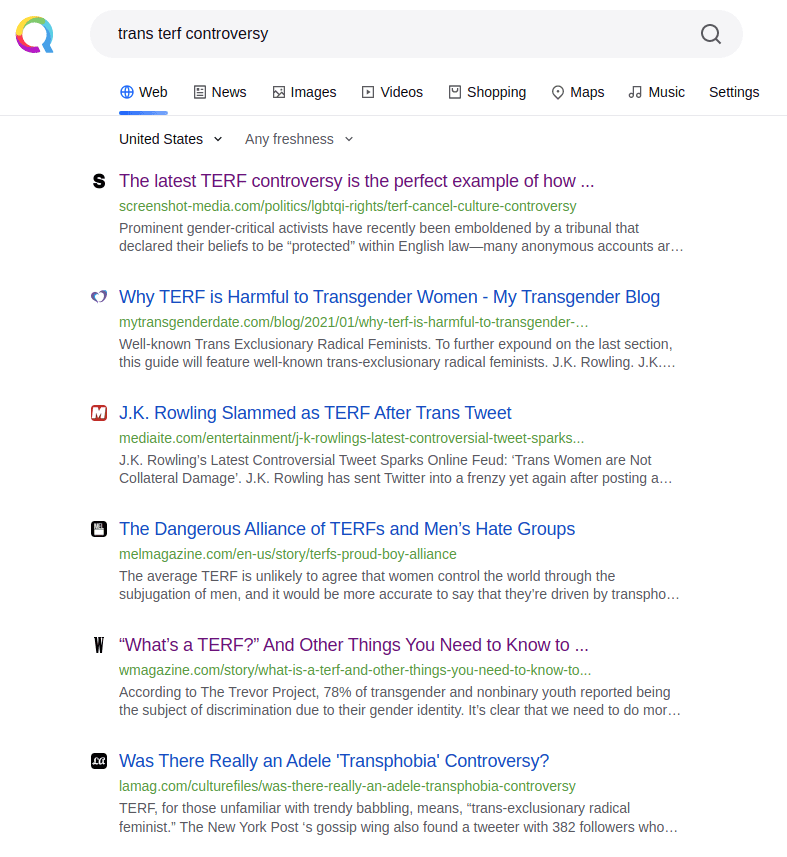
ame ‘Lucene90’ does not exist. You need to add the corresponding JAR file supporting this SPI to your classpath. The current classpath supports the following names: [IDVersion]
- Very poor. At least it had some results (unlike Brave), but they are useless. Seems partly based on Bing.
How to initialize an array of the first ten integers briefly ruby
- Returns good StackOverflow pages in the first two results. The rest are more general, but that’s not worse than DDG. Only Google is better (and there I’d recommend using StartPage instead since they give you Google results without the spyware).
Thomas Reid theory of perception
- Here we have the first instance where the Qwant results are significantly worse than Brave. Result #1 is a student paper, a PDF; then come some academic sources which are fine, and finally we get some relevant SEP and IEP articles in positions 8 and 9.
- Seems to be derived from Bing.
“God was with him”
- This is a bit different from Brave. The results are: a blog on the meaning of the phrase; a collection of Bible quotes; two sermons; etc. Anyway, not too bad, but I like Brave’s results more here, too.
pizza near me
- Interesting. Qwant is so averse to making use of your personal information that they do not even make use of your IP address to give you personalized results. That’s quite OK by me.
- When I do “pizza near [a town near me]”, I get some pages, not its own results, giving “The 10 BEST Pizza Places in …”. I like this more. These are actually useful results.
‘Shamrock Hill’ reel
- Excellent results, in the order I’d prefer. The double-quote version is not the same, but also good. The latter in particular are quite close to Bing’s.
Summary of findings about Qwant: I could see switching to Qwant, but their use of Bing is a sticking point. The results are better than Brave’s in most cases, but they do still seem to make heavy use of Bing; still, they appear to use data not reflected in Bing’s results. I would need to study to what extent Qwant uses Bing. A bit too much for my taste, I think. And my updated conclusion is the fact that Qwant decided to censor Russian state media for me is a reason to think they’re not above censoring all sorts of other things. That sort of controlling behavior is not a thing I can support or endorse, so it’s a firm “no” from me to Qwant.
Briefer reviews
Other search engines present some interesting options, but ultimately, I was disappointed. Gigablast had its start in 2000 and since 2013 has been open source. It claims to be an independent web crawler. The front page sports a U.S. flag and the tagline, “F*** all dictators!” (without the asterisks); search results are shown with a rather bizarre design. But the results are OK, as far as I can tell. They still place sometimes Wikipedia on top as in the case of “George Washington”, but the results for “Ukraine” were different: CIA Factbook came first, then U.K. travel advice, Twitter hashtag #Ukraine, and lo and behold, between Ukraine Tax Treaty Documents and HuffPo, there is the Ukraine landing page at Epoch Times. “Inflation and gas prices” ranges from Democratic Underground to Daily Mail, with everything in between; the results are certainly more diverse than the others. Meanwhile, “trans terf controversy” has even more radical trans sources, but also more articles from the Daily Mail. The long Java error message generated simply “Error = Query too big”, while the Ruby query generated useful results. The ” ‘Shamrock Hill’ reel” results were embarrassingly bad.
Gibiru…stop the presses! Update! I just noticed that all their search results are actually routed through Google. Avoid. Anyway, Gibiru bills itself as not just another privacy-oriented search engine, but also as “uncensored.” The latter is strictly marketing, however, and probably means very little; the results I saw were pretty typical. Its results do appear to be comparable to Brave and Qwant in terms of relevance, but sometimes a bit strange (the “George Washington” search didn’t inspire confidence, but others were OK). They are still dominated by establishment news, though with perhaps more centrist and factual Establishment sources. I could find no information about the sources of their index, but it was frequently similar to Brave. It is harder in their case to demonstrate that they use other search engines, but they might. (I could find no information on this.) Update, again: avoid Gibiru. They route their searches through Google.
Mojeek gives plenty of info about itself, and it claims to be entirely independent, having built its own index. So, that’s nice. How does it do? “George Washington” results are pretty spotty; it begins with Wikipedia, and five of the next six results do not actually concern George Washington, but things (or people) named after him. It does well with “catcher in the rye summary”, but poorly with “Where do ducks go when ponds freeze over?”, though it is entirely clear that the results are very different from other search engine’s, which is nice, as far as it goes. “Ukraine” has neither very much nor high-quality info about the country in general, nor even a decent selection of news, though mostly it’s news. In short, the rest is mostly of poor quality and not really ready for prime time; it reminds me of the also-ran search engines of yesteryear, full of puzzling, irrelevant results.
One more search, just to double-check
Frankly, the main reason I am disappointed with DDG is its move toward censorship and ideological filtering—which was one of the main reasons I had for abandoning Google in the first place. So you might do several ideological searches, comparing DDG, Brave, Qwant, Gigablast, and Gibiru. (I’m not going to bother with Mojeek because its results are so often useless.)
Well, I’ll try one, because this takes a long time. What search term shall I try? How about…
gay marriage
I am not suggesting that there’s something wrong with gay marriage. I’m using this as a sharp divider between Establishment liberals and disaffected conservatives.
- DDG: This was weird because I ended up refreshing the page a few different times and my results changed very slightly each time. It always begins with Wikipedia and History.com, but in the third place is ProCon.org, which I can vouch is scrupulously neutral (I know the founder). Then Wikipedia again, IGLTA (International LGBTQ+ Travel Association), once I saw The Knot.com (an interest group for gay marriage), GotQuestions.org (uber-conservative), once I saw Brookings.edu (uber-DC Establishment), tfpstudentaction.org (blog of a “Tradition, Family, Property Student Action” group), an IMDb movie page, a Georgetown academic page, and a pro-gay marriage Psych Today article. So, DDG is certainly on its way to liberal orthodoxy, but it does have two firmly conservative pages and one studiously middle-of-the-road pages; all the rest are quite liberal in point of view.
- Brave Search: sources include Wikipedia, ProCon again (wonderful), Council on Foreign Relations (pretends to neutrality and factuality but is of course firmly in the pro-gay marriage camp), American Psych Assoc (very pro), New Yorker, Pew Research (5 facts, all good news for gay marriage, but does seem to be factual), Human Rights Campaign (pro), USN&WR (factual page on same-sex marriage around the world), Britannica, History.com. Of these, I would count 1-3 as neutral, none conservative, and all the rest strongly pro-gay marriage. OK then. And that’s supposed to be our replacement for DDG because DDG has abandoned principle? Hmm.
- Qwant: here we have Wikipedia, History.com, ProCon again, an IMDb movie page, the TFPStudentAction blog from DDG, a Georgetown academic page, Wikipedia again, the Psych Today pro article, an attempt at a neutral “pro and con” article from Marriage.com, and TheKnot page. That’s it. The results are very similar to DDG.
- Gigablast: sources include NY Times (three articles), Obergefell v. Hodges itself (nice!), Gay Wedding Blog on Facebook plus two other Facebook pages, CNN Money (touting the “big business” of gay weddings), a page on the conservative Christian blog All About Worldview, two IMDb movie pages, three Pew Forum research pages (mostly factual), two activist GLAAD pages, The Atlantic, three (pro) Amazon book pages, another Obergefell law page, three EventBrite “Gay Wedding Show” pages, SCOTUSblog (law, factual), Newsweek (three different URLs pointing to the same pro article; embarrassing), three Politico pages…and it goes on. Well, here again we have one conservative blog post, several more or less factual (or perhaps more subtly biased) law and polling pages, and all the rest, the vast majority of the pages, are wildly pro. OK dokey.
- Gibiru: here we have Wikipedia, ProCon, Obergefell itself, NPR, ABC, CFR again, Human Rights Campaign again, another Obergefell law page, Pew, Britannica, Pew again, a U.S. Citizenship and Immigration Services FAQ page, a YouTube video embarrassing to Hillary Clinton, a SSA (U.S. gov) page, a YouTube song (it’s funny I guess), Pew a third time, BBC, Gallup, the Georgetown academic page, and Gallup again. Now, this is interesting. Gibiru actually focuses on supplying mostly (i.e., the majority of the pages) polling info and sociological and legal facts. So frankly, maybe this should be called the winner on this search; if you actually wanted to learn about the topic, as opposed to absorbing opinion, Gibiru would be a better source than the previous four.
There is so much overlap here—when I am very sure these pages that just keep coming up have no great justification to keep coming up—that I am curious what Bing has. Let’s have a look, shall we?
- Bing: …yeah. A lot of articles we’ve seen above. Wikipedia, history.com, ProCon, GotQuestions, TFPStudentAction (i.e., the two conservative articles I was impressed to see in DDG), Psych Today, the Georgetown page, WorldPopulationReview.com (the only one found only here), a pro YouTube video, and another Wikipedia page (shown to me because Bing knows I’m in Ohio).
And a quick check of Google also surfaces many of these. So what does that show? It shows that DDG is still using Bing results heavily; but, to a slightly lesser extent, so are Brave, Qwant, and perhaps Gibiru too. They might all also use Google as well. Only Gigablast is very different, but it’s very biased. Gibiru, as I said, focuses on facts and seems to downrank opinion, which is better at least than results stuffed with left-wing opinion.
Tentative Conclusion
According to this highly unscientific and small amount of testing, if you want to avoid ideological bias similar to Google’s, switching from DDG to Brave Search will not actually be an improvement. DDG still seems to make heavy use of Bing, which is why it’s so similar to Qwant, which also uses Bing. Gigablast will give you something different, for sure, but it has a weird design and is just as left-wing as the rest. Gibiru might make use of other sources for its index, and it is not so obviously based mainly on Bing; and it is sometimes more focused on facts over opinion, but not always.
These are all my vague impressions based on hours spent staring at and comparing search results.
My overall conclusion is not good news for people who are interested in neutral and factual information: We do not really seem to have any meaningful choices when it comes to search engines. These are all better than Google, though, in terms of ideological bias.
Sorry. Wish the news were better. I really wanted to like Brave, and failing Brave, then something else. Heck, in terms of simply giving the conservative Internet a voice, DDG and Brave seem no better than Bing. But it should of course be better in terms of privacy.
(But I’ll tell you what. As I constructed this, I frequently made use of the KSF-run encyclopedia meta-search engine EncycloSearch, because I knew I wanted a basic encyclopedia article, and this is actually more useful in surfacing a good variety of such articles than general search engines do. It won’t replace a general search engine, but sometimes it’s better than one.)
“But Wait,” You Say
Some people will look at the conclusions and say—as they often do, regarding bias in the news media, Wikipedia, and academia—that this state of affairs is simply a reflection of reality. These information sources all seem to be biased because, as leftists sometimes smugly and laughably say, reality “has a liberal bias.” Similarly, the reason all search engines seem to have a bias toward left-wing information is that there is simply more left-wing information online. Most people writing substantive material online, which might be linked-to from a search engine, just happen to share views that I would describe as “Establishment left.” And so what? I am asked.
I do not know if the latter claim true. Maybe it is. On certain topics (such as some of my searches, like “trans terf controversy” and “gay marriage”), of course there is a lot more written on the topics from a left-wing point of view. This is easily spotted and not hard to acknowledge.
But does that mean search engines must be designed so as to reflect the proportion of an ideological weighting among all possible search results? Of course not. We can design search engines however we like. As with news, reference, and education, I would prefer that the information I get from search engines be scrupulously designed so as to make it easier for me to make up my own mind about controversial topics, not harder. We might not agree on what ought to be controversial; as a philosopher and free thinker (very broadly speaking), I would like to be exposed to a very wide variety of points of view. The thought that search engines, like those other info sources, are designed to manipulate me—as they manifestly are—makes me livid. I am not a programmable robot. I am a free and critically-thinking citizen of a republic, or I would like to be, anyway.
Look at it this way. Among the responses to searches on politically charged topics such as “Ukraine” and “gay marriage,” there are boatloads of relevant pages, from a wide variety of sources, that I would want placed higher than just these. Why on earth should we constantly see Wikipedia, New York Times, Britannica, Vox, Pew, ABC News, CNN, etc., come up over and over and over again? I don’t mean I want to see more of Fox, WSJ, the New York Post, and the Daily Mail. I mean, that wouldn’t hurt, but that’s not my point. I would like to see high-quality material (there is a lot) from the long tail of downranked websites. I saw the Epoch Times once, and the Federalist, Breitbart, and National Review never. There were very few relatively obscure websites.
The broad overlap in most search results is a massive smoking gun that search is wrong. Massive amounts of useful content can only be found by drilling down into individual sites. It’s systematically hidden.
It seems to me there is a wide open opportunity for fresh, new kinds of search engines, with obvious features such as:
- Ideological sliders. Why can’t I just specify that I want to see more conservative results, or more liberal results? And why stop there? Why not allow users specifically to give more weight to results that are Christian, atheist, traditionalist, feminist, libertarian, communist, techie, lawyerly, academic, etc.? We’ve been robbed, people. Why haven’t they done this? I’ll tell you why. It’s not because giant corporations like Google and Microsoft can’t make such a product. Of course they can. It’s because they don’t want to. They want to control you. That’s rather the whole point, for the oligarchs in control of the Googles of the world.
- Easy switching between nationalities, and blending. I’d love to see a combo of American, English, Canadian, Australian, and Kiwi results.
- Opinion search. We need more intelligent and deep indexing and results from blogs, Reddit, Quora, and the like.
- Use of user ratings of content. With, of course, the absolutely essential ability to control which categories of raters that one will trust. This is how many social websites work internally (Amazon, YouTube, Twitter, etc.); why not the entire web, then? There is an answer: it’s because Google and Microsoft don’t actually want you to weighing in on certain information sources; you might come to the wrong conclusions.
- In short, lots of settings. Who the hell decided it was a good idea to make the search experience the same for everyone in an entire country? I’ll tell you who: people to whom it is very important that they retain the ability to make entire countries (and ultimately the whole world) think the same way.
We’re very far from such search engines. I don’t know what I’m going to use going forward. I’ll probably switch off among the above until I settle in with one that I like best. But I won’t be happy about it.
What I’d really like to see is a statistical measurement of the top, say, 20 results from the top dozen or 20 search engines, on 1000 different quite various queries. Questions I want answered:
(1) How different are the results, on average, from Google and Bing?
(2) How many of the results are unique or very rare (compared to other search engines)?
Basically, I think there are boatloads of great content that rarely show high up on any search engines. Of course, this is necessitated by the sheer size of the web versus the limited real estate at the top of search results. But still: my contention is that, very often, there are better results that never float to the top of any of these search engines.
And that’s a problem they should have solved by now.
Leave a Reply